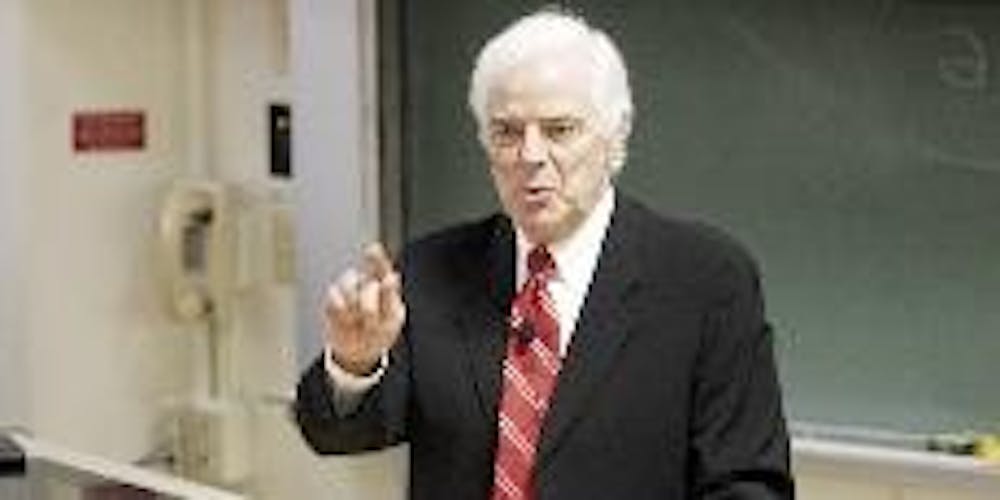
Journalist Nick Clooney speaks about the crisis in Darfur Tuesday evening in Laws Hall. (Michael Pickering)
He said that he left as a journalist, and came back an advocate.
Veteran reporter Nick Clooney shared his experiences filming an independent documentary in the Darfur region of Sudan to an overflowing room of students and faculty Tuesday afternoon.
During his speech, "A Newsman on Darfur," Clooney spoke of the powerful experiences he had in Africa in April 2006 and how he hopes the U.S. government and the national media will step up to the plate to bring an end to the genocide in the region.
"Genocide up close and personal is a very ugly thing," Clooney said.
Clooney is the father of actor George Clooney, and both visited refugee camps to build the basis of their documentary.
In A Journey to Darfur, Clooney brings the situation of the nearly two million Sudanese refugees to American audiences.
The Bush administration declared Sept. 9, 2006 the tragedies committed by the militia group known as Janjaweed in Darfur as genocide. The government-supplied Arab group is believed to have killed about 400,000.
During his trip, Clooney spoke to many survivors from the villages that had been massacred and burned, but he told audience members that one woman in particular still lingers in his mind.
He recalled sitting down with the Sudanese woman who had a baby in her arms. She told him of the day the Janjaweed attacked her village and killed her other 6-year-old son.
Clooney paused after telling this story, and the crowded Laws Hall lecture room fell silent.
Enjoy what you're reading?
Signup for our newsletter
"Each of us has done or seen something that haunts you," Clooney said. "In those three seconds just before you sleep, an image will sneak into your consciousness ... (This story is) what sneaks into mine, three nights a week."
When asked about what impact American college students could have in Darfur, Clooney told the audience to pressure their Congressional representative with active questions and expectations.
Patricia Gallagher Newberry, journalism instructor, said that she thought that Clooney's speech was inspiring for students.
"In the end, I hope students will pick up their phones and call their representatives," Newberry said. "(Clooney) certainly called students to action."
Clooney also offered several possible courses of action for the U.S. government.
First, Clooney said he believes troops need to be sent and protect those still alive who are still in danger of rape and murder in the refugee camps.
Next, he said the U.S. should urge peace in Sudan. A diplomatic model already exists from the peacekeeping agreements arranged in northern and southern Sudan. According to Clooney, the U.S. should use this model to arrange a new peace.
With the insistence of the United States, Clooney is confident there will be a change. He said continual attention and awareness would bring this change.
Tuesday's speech was Clooney's 51st since June 2006. His wife Nina organizes most of his visits, thought neither of them has a computer. The two have been married for almost 50 years and live in August, Ky.
"(We will continue campaigning for) as long as it takes, as long as there is an interest," Nina said. "The goal is to get the troops in to protect those people."




